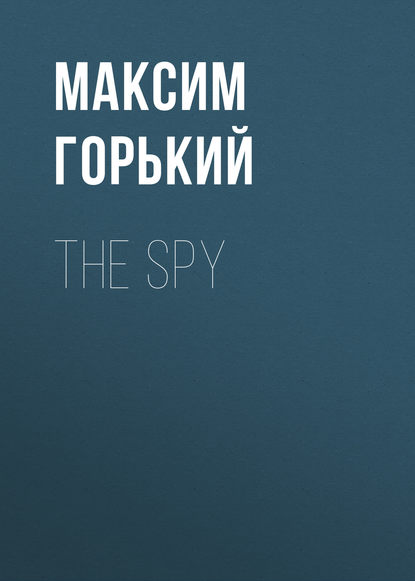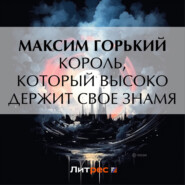По всем вопросам обращайтесь на: info@litportal.ru
(©) 2003-2024.
✖
The Spy
Настройки чтения
Размер шрифта
Высота строк
Поля
Klimkov did not answer at once. At the end of a few moments he said:
"Well, they are good people, and they attained to what they wanted."
"And didn't it occur to you that you were in a bad business?"
Yevsey sighed.
"Why, I don't like it. I do what I'm told to do."
The author stepped up to him, then turned aside. Klimkov saw the door through which he had entered, saw it because the author's glance was turned to it.
"I ought to go," he thought.
"Do you want to ask me anything?" inquired the author.
"No, I am going."
"Good-by." And the host moved to let him pass. Yevsey walking on tip-toe went into the ante-chamber, where he began to put on his overcoat. From the door of the room he heard a question:
"Listen, why did you tell me about yourself?"
Squeezing his hat in his hands Yevsey thought, and answered:
"Just so. Timofey Vasilyevich respects you very much, the one who sent me."
The writer smiled.
"Aha! Is that all?"
"Why did I tell him?" Klimkov suddenly wondered. Blinking his eyes, he looked fixedly into the author's face.
"Well, good-by," said the host, rubbing his hands. He moved away from his visitor.
Yevsey nodded to him politely.
"Good-by."
When he came out of the house, he looked around, and immediately observed the black figure of a man at the end of the street in the grey twilight of the morning. The man was quietly striding along the pavement holding his head bent.
"He's waiting," Klimkov thought. He shrank back. "He'll scold me. He'll say it was too long."
The spy must have heard the resonant sound of steps on the frozen paving in the stillness of the morning. He raised his head, and fairly ran to meet Yevsey.
"Did you give it to him? Yes?"
"I did."
"Why were you so long? Did he speak to you? What did he ask?"
Maklakov shivered. His cheeks were blue, his nose red. He seized the lapels of Yevsey's overcoat, and instantly released him, blew on his fingers, as if he had burned them, and began to tramp his feet on the ground. Thus, chilled through and through, and pitiful, he was not awe-inspiring.
"I, too, told him all my life," Yevsey declared aloud. It was pleasant to tell Maklakov about it.
"Well, didn't he ask about me?"
"He asked whether you had gone away."
"What did you say?"
"I said you had."
"Yes. Nothing else?"
"Nothing."
"Well, let's go. I'm frozen, brother." Maklakov darted forward, thrusting his hands in his overcoat pockets, and hunching his back. "So you told him your life?"
"The whole of it, completely, to the very moment of my last meeting with you," answered Yevsey, again experiencing a pleasant sensation, which raised him to the same level as the spy whom he respected.
"What did he say to you then?"
For some reason confused and embarrassed Klimkov waited before he replied.
"He didn't say anything."
Maklakov stopped, seized him by the sleeve, and asked in a stern though quiet tone:
"Did you give him my papers?"
"Search me, Timofey Vasilyevich," Yevsey cried sincerely.
"I won't," said Maklakov, after reflecting. "Well, now good-by. I'll disappear this very day. Take my advice. I'm giving it, because I pity you. Get out of this service and be quick about it. It's not for you, you know it yourself. Go away now. Now is the time to leave. You see what days these are. The dead are coming to life, people trust one another, they can forgive much in a period like this; they can forgive everything, I think. And above all, avoid Sasha. He's sick and insane. He's made you deliver up your cousin, he – he ought to be killed, like a mangy dog. Well, good-by, brother." He seized Yevsey's hand in his cold fingers, and pressed it firmly. "So you gave him my papers?" he asked once more. "You're sure of it, are you?"
"I did – by God! The moment I caught sight of him I at once remembered him."
"All right. I believe you. Don't speak about me there for a few days, I beg you."
"I'm not going there. On the twentieth I'll call for my salary."
"Tell them then. By that time I'll be far away. Good-by."
He turned the corner quickly. Yevsey looked after him, thinking suspiciously:
"He's going off. Probably he did something against the authorities, and got frightened. How he looks, just as if he had gotten a beating."
He grew sorry for himself at the thought that he would never again see Maklakov. Nevertheless, it was agreeable to recall how weak, chilled through, and troubled the spy had looked, the spy who had always borne himself so calmly and firmly.
"He spoke boldly even with the officers of the Department of Safety, spoke to them as if he were their equal. But apparently he was all the time afraid of the author who was under surveillance. And here am I, a little man," thought Yevsey, as he strode down the street, "a little man, afraid of everybody, yet the author didn't frighten me. I was drinking tea at his house, while Maklakov was shivering on the street." Klimkov content with himself smiled. "He couldn't say anything, the author couldn't." Yevsey was suddenly seized with a mingled feeling of sadness and insult. He slackened his pace, and sank into reflections as to why this was. He sought the cause of the grief that unexpectedly rose within him.

















